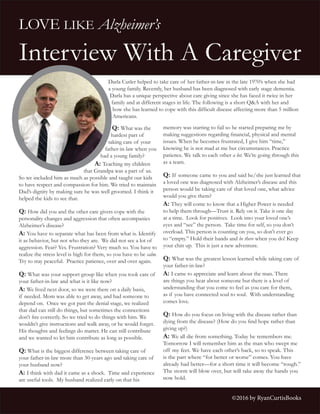More Related Content
Similar to Q&A with Doug and Darla web
Similar to Q&A with Doug and Darla web (20)
Q&A with Doug and Darla web
- 1. LOVE LIKE Alzheimer’s
Interview With A Caregiver
Q: What was the
hardest part of
taking care of your
father-in-law when you
had a young family?
A: Teaching my children
that Grandpa was a part of us.
So we included him as much as possible and taught our kids
to have respect and compassion for him. We tried to maintain
Dad’s dignity by making sure he was well groomed. I think it
helped the kids to see that.
Q: How did you and the other care givers cope with the
personality changes and aggression that often accompanies
Alzheimer’s disease?
A: You have to separate what has been from what is. Identify
it as behavior, but not who they are. We did not see a lot of
aggression. Fear? Yes. Frustration? Very much so. You have to
realize the stress level is high for them, so you have to be calm.
Try to stay peaceful. Practice patience, over and over again.
Q: What was your support group like when you took care of
your father-in-law and what is it like now?
A: We lived next door, so we were there on a daily basis,
if needed. Mom was able to get away, and had someone to
depend on. Once we got past the denial stage, we realized
that dad can still do things, but sometimes the connections
don’t fire correctly. So we tried to do things with him. We
wouldn’t give instructions and walk away, or he would forget.
His thoughts and feelings do matter. He can still contribute
and we wanted to let him contribute as long as possible.
Q: What is the biggest difference between taking care of
your father-in-law more than 30-years ago and taking care of
your husband now?
A: I think with dad it came as a shock. Time and experience
are useful tools. My husband realized early on that his
memory was starting to fail so he started preparing me by
making suggestions regarding financial, physical and mental
issues. When he becomes frustrated, I give him “time,”
knowing he is not mad at me but circumstances. Practice
patience. We talk to each other a lot. We’re going through this
as a team.
Q: If someone came to you and said he/she just learned that
a loved one was diagnosed with Alzheimer’s disease and this
person would be taking care of that loved one, what advice
would you give them?
A: They will come to know that a Higher Power is needed
to help them through—Trust it. Rely on it. Take it one day
at a time. Look for positives. Look into your loved one’s
eyes and “see” the person. Take time for self, so you don’t
overload. This person is counting on you, so don’t ever go
to “empty.” Hold their hands and be there when you do! Keep
your chin up. This is just a new adventure.
Q: What was the greatest lesson learned while taking care of
your father-in-law?
A: I came to appreciate and learn about the man. There
are things you hear about someone but there is a level of
understanding that you come to feel as you care for them,
as if you have connected soul to soul. With understanding
comes love.
Q: How do you focus on living with the disease rather than
dying from the disease? (How do you find hope rather than
giving up?)
A: We all die from something. Today he remembers me.
Tomorrow I will remember him as the man who swept me
off my feet. We have each other’s back, so to speak. This
is the part where “for better or worse” comes. You have
already had better—for a short time it will become “rough.”
The storm will blow over, but will take away the hands you
now hold.
Darla Cutler helped to take care of her father-in-law in the late 1970’s when she had
a young family. Recently, her husband has been diagnosed with early stage dementia.
Darla has a unique perspective about care giving since she has faced it twice in her
family and at different stages in life. The following is a short Q&A with her and
how she has learned to cope with this difficult disease affecting more than 5 million
Americans.
©2016 by RyanCurtisBooks
